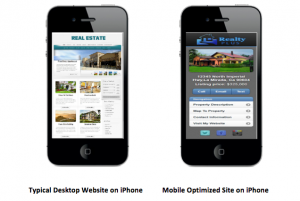 As a busy Real Estate Agent, your mobile phone is probably one of life’s essentials, as it is for the vast majority of the world’s population today. Almost everybody has one, and it goes everywhere with them, always within reach.
As a busy Real Estate Agent, your mobile phone is probably one of life’s essentials, as it is for the vast majority of the world’s population today. Almost everybody has one, and it goes everywhere with them, always within reach.
Around half of all mobile phones in use today, of which there approximately 4 billion, are smart phones with Internet capability. Google, the world’s no.1 search engine, has seen an exponential growth in the number of searches being performed on a mobile device, and it’s predicted that more people will access the internet from their smart phone than from their personal computers by early 2014 at the latest.
These days, mobile phones are far more than just a calling device. Smart phones are like a pocket PC, always on, always accessible to text, email, Tweet and Chat. Smart phone users “check in” to the places they visit, they take photos and videos of things they like, and share them with their friends on Facebook and Instagram.
They use their mobile to get directions to where they want to go. They use it to shop, to browse websites of interest, and to get information quickly, whenever they want it, and wherever they happen to be at the time, whether that’s at home, waiting in line somewhere, commuting to work or eating out.
In other words, the mobile smart phone has become an integral and inseparable part of our daily lives.
Why Is A Mobile Website So Important?
I’ve clearly established that the general use of mobile, hand held devices like smart phones, iPads and tablets has grown, and continues to grow, exponentially. I’ve also established that the use of mobile devices to access the internet is very soon set to surpass the use of desktop computers to access the internet.
Agents who want to take full advantage of this growing trend, and who don’t want to be left behind, must give mobile users access to their website and information in a format that’s friendly to the user’s device. In other words, they must cater to the smaller screens on mobile devices.
Although most websites can be displayed on a mobile device, traditional websites designed to be accessed via a desktop computer or laptop are not suitable for actually viewing on a mobile device.
The text is far too small to read without the user constantly “expanding”, “pinching” and scrolling around. The file size of the images is too large to load quickly on a mobile device, if they load at all. Navigation is slow and difficult so the mobile user cannot find what they want or cannot easily visit more than one page of the site. These problems cause a great deal of frustration for the mobile visitor and leads to an extremely disappointing experience for them, which in turn puts the business owner in a very bad light.
Just as internet users expect businesses to have a website, mobile internet users expect businesses to have a mobile friendly website. Considering that half of all Internet searches for local products and services are performed on a mobile device, if your website does not load properly or makes it difficult for people to find what they are looking for, not only is your reputation on the line, you are also potentially losing hundreds of customers.
How is a mobile Website different?
A mobile website is coded specifically for mobile devices so it not only loads quickly, but the layout is suitable for small hand held devices so the content displays clearly on the small screen.
- Navigation is simple, with large, thumb friendly buttons and links.
- Text is easy to read and if any scrolling is necessary, it will be in a vertical direction only.
- Images are optimised to load quickly.
- A mobile website makes it easy for people to contact you, with tap to call, tap to text and tap to email buttons.
- It will have a contact form that utilises a virtual keyboard for ease of typing the message.
- Social sharing buttons like Facebook, Twitter and Google Plus will also be thumb friendly.
- A mobile website is accessible on all hand held devices, including iPhones, Androids, iPads and other tablet devices, and is served up automatically, via mobile redirect, whenever any of these devices tries to access your content through your normal website address.
- A mobile website will also make use of the device’s GPS functionality and incorporate Google Maps so people can easily get directions to you, or your listings.
In other words, the mobile visitor would have everything they wanted, quickly and clearly, right there in front of them, within seconds.

How can a mobile website help you?
A mobile website can help you as a real estate agent in so many ways, so let’s look at a few scenarios to illustrate this.
– Out And About: Scenario 1
Bob Jones is in the market for a new house. Using his laptop at home, he’s looked at houses on the internet, shortlisted a few that look promising, and is driving around looking at areas he’s interested in. Suddenly he comes across a house for sale that’s not on his shortlist. It looks really nice, in a perfect location and Bob would love to find out more. He pulls up to the side of the road and gets out his mobile smart phone.
The sale sign has the agent’s number on it, but he doesn’t really want to chat at this stage, nor does he have time to chat, so he looks up the website on the internet, using his cell phone’s network connection. Several minutes later he’s still waiting for the website to load. Running out of time and patience, Bob gets back in the car and decides it just wasn’t meant to be. He’s got other houses to look at and hopefully one of them will be the one. Bob drives off and forgets about that particular house.
– Out And About: Scenario 2
Like Bob in Scenario 1 above, Mike Davies is out and about looking at areas he’s interested in living. He’s spotted a house that’s for sale that he likes the look of and pulled up to the side of the road.
Mike pulls out his smart phone and right there on the sale sign, next to the phone number of the agent and the web address, is a QR code. Excellent! Mike’s been seeing these funny bar codes around places more and more and knows that if he scans it with his mobile phone, it will probably open up a web browser and direct him to a page on the internet.
A few seconds later Mike has all the details of the house he’s standing in front of, right there on his mobile phone. He can see what the kitchen looks like, how big the bedrooms are, and what a fabulous back yard it has. It looks perfect for him and his family!
He’s so excited about this house that he bookmarks it to his favorites and then shares it with his friends and family on Facebook and Twitter. Mike taps one of the thumb friendly buttons and quickly fires off a text message to the agent to arrange a proper viewing.
If things all go to plan, Mike and his family will be in their new home sooner than they thought!
Statistics show that it’s not just when they are out and about that people use their mobile phones. Smart phone usage while at home is very common. So let’s look at another situation where having a mobile website would benefit you as a real estate agent.
– At Home: Scenario 1
Sam Rodriguez is at home, relaxing on his couch, leafing through the “properties for sale” section in the local newspaper. He’s got his smart phone right there beside him on the arm of the chair. He’s also got a pen and is circling each property that he likes the look of, ready to go and look up the various real estate agents’ websites on his computer when he’s got his list together.
Sam doesn’t really enjoy this side of looking for a new house. It seems quite a tedious process to him and he’s a busy man, but it has to be done. He turns the page and there’s an advertisement for a really nice looking house. Sam circles the ad, but then notices a QR code right next to the agents’ contact details. Sam grabs his cell phone from the arm of the chair and scans the code with the phone’s reader. Seconds later a mini website dedicated to that property is loaded up on his screen. A slideshow starts to play, giving him a virtual tour of the whole house. It looks perfect!
Sam is very impressed with the agent for having such a great website that he can actually read properly and navigate easily on his mobile phone. If only all the Real Estate Agents were like this!
He taps one of the thumb friendly buttons and a location map for the property appears. He taps another one of the thumb friendly buttons and up pops a contact form, which he promptly completes using the virtual keyboard on his phone, requesting a viewing as soon as possible.
Sam Rodriguez is a happy man! He’s found a house he likes the look of, had a virtual tour and made an appointment to view it, all from the comfort of his sofa.
– At Home: Scenario 2
Diane Peters is at home watching her favorite program on television. During the ad break she checks her Facebook and learns that her friend Stella is totally fed up as she’s having to miss her favorite TV program because she’s tied to the computer in her home office looking for a new house.
In the next ad break Diane hears an ad for a local real estate agent. She thinks of poor Stella on her computer. Then she hears the agent mention their mobile website. Curious, Diane types in the web address on her cell phone’s browser, and seconds later a website appears that doesn’t look like anything she’s seen before. She doesn’t have to pinch and scroll, she can actually read it properly on the small screen of her phone. She can even navigate around easily using the large thumb friendly buttons. All the pictures of the houses listed are loading quickly and are crystal clear on her phone.
If only Stella knew about this website, Diane thinks, and then notices the social sharing icons. She smiles and taps the Facebook icon to instantly send Stella the Real Estate Agent’s website.
During the next ad break, Diane checks her Facebook again and is just one of Stella’s friends to see her latest post: “Watching TV with the family and house hunting during the ad break from the comfort of my living room. Thanks Diane, this Realtor’s website is a keeper.”
Conclusion
Hopefully this has helped you to understand just how important it is for today’s Real Estate Agents to have a strong mobile presence.
The question every agent should be asking is no longer “Why should I invest in mobile?”, but rather “How should I invest in mobile?”. The starting point for any agent to invest in mobile is with a mobile friendly website for their property listings.
If you would like professional help with mobile websites for your listings, please contact me to setup a free consultation.
Discover more from RealtyTechBytes.com by Jerry Kidd
Subscribe to get the latest posts sent to your email.






